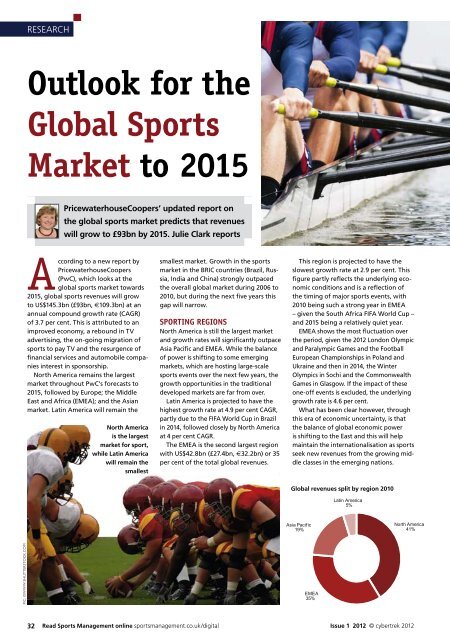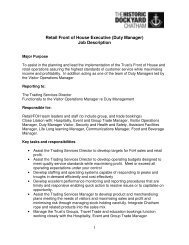Sports Management Issue 1 2012 - Leisure Opportunities
Sports Management Issue 1 2012 - Leisure Opportunities
Sports Management Issue 1 2012 - Leisure Opportunities
You also want an ePaper? Increase the reach of your titles
YUMPU automatically turns print PDFs into web optimized ePapers that Google loves.
RESEARCH<br />
Outlook for the<br />
Global <strong>Sports</strong><br />
Market to 2015<br />
A<br />
PricewaterhouseCoopers’ updated report on<br />
the global sports market predicts that revenues<br />
will grow to £93bn by 2015. Julie Clark reports<br />
ccording to a new report by<br />
PricewaterhouseCoopers<br />
(PwC), which looks at the<br />
global sports market towards<br />
2015, global sports revenues will grow<br />
to US$145.3bn (£93bn, 109.3bn) at an<br />
annual compound growth rate (CAGR)<br />
of 3.7 per cent. This is attributed to an<br />
improved economy, a rebound in TV<br />
advertising, the on-going migration of<br />
sports to pay TV and the resurgence of<br />
financial services and automobile companies<br />
interest in sponsorship.<br />
North America remains the largest<br />
market throughout PwC’s forecasts to<br />
2015, followed by Europe; the Middle<br />
East and Africa (EMEA); and the Asian<br />
market. Latin America will remain the<br />
North America<br />
is the largest<br />
market for sport,<br />
while Latin America<br />
will remain the<br />
smallest<br />
smallest market. Growth in the sports<br />
market in the BRIC countries (Brazil, Russia,<br />
India and China) strongly outpaced<br />
the overall global market during 2006 to<br />
2010, but during the next five years this<br />
gap will narrow.<br />
SPORTING REGIONS<br />
North America is still the largest market<br />
and growth rates will significantly outpace<br />
Asia Pacific and EMEA. While the balance<br />
of power is shifting to some emerging<br />
markets, which are hosting large-scale<br />
sports events over the next few years, the<br />
growth opportunities in the traditional<br />
developed markets are far from over.<br />
Latin America is projected to have the<br />
highest growth rate at 4.9 per cent CAGR,<br />
partly due to the FIFA World Cup in Brazil<br />
in 2014, followed closely by North America<br />
at 4 per cent CAGR.<br />
The EMEA is the second largest region<br />
with US$42.8bn (£27.4bn, 32.2bn) or 35<br />
per cent of the total global revenues.<br />
This region is projected to have the<br />
slowest growth rate at 2.9 per cent. This<br />
figure partly reflects the underlying economic<br />
conditions and is a reflection of<br />
the timing of major sports events, with<br />
2010 being such a strong year in EMEA<br />
– given the South Africa FIFA World Cup –<br />
and 2015 being a relatively quiet year.<br />
EMEA shows the most fluctuation over<br />
the period, given the <strong>2012</strong> London Olympic<br />
and Paralympic Games and the Football<br />
European Championships in Poland and<br />
Ukraine and then in 2014, the Winter<br />
Olympics in Sochi and the Commonwealth<br />
Games in Glasgow. If the impact of these<br />
one-off events is excluded, the underlying<br />
growth rate is 4.6 per cent.<br />
What has been clear however, through<br />
this era of economic uncertainty, is that<br />
the balance of global economic power<br />
is shifting to the East and this will help<br />
maintain the internationalisation as sports<br />
seek new revenues from the growing middle<br />
classes in the emerging nations.<br />
Global revenues split by region 2010<br />
Latin America<br />
5%<br />
Asia Pacific<br />
19%<br />
North America<br />
41%<br />
PIC: ©WWW.SHUTTERSTOCK.COM<br />
EMEA<br />
35%<br />
32 Read <strong>Sports</strong> <strong>Management</strong> online sportsmanagement.co.uk/digital<br />
<strong>Issue</strong> 1 <strong>2012</strong> © cybertrek <strong>2012</strong>
















